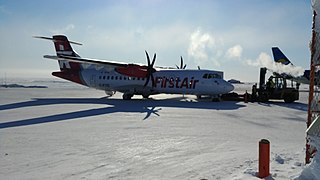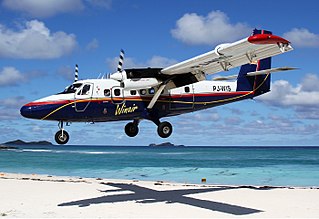
Bradley Air Services Limited, operating as First Air, was an airline headquartered in Kanata, a suburb of Ottawa, Ontario, Canada. It operated services to 34 communities in Nunavut, Nunavik, and the Northwest Territories. First Air has assisted in various humanitarian missions such as the 2010 Haiti earthquake, airlifting relief supplies and equipment. Its main base, which included a large hangar, cargo and maintenance facility, was located at Ottawa Macdonald–Cartier International Airport, with hubs at Iqaluit Airport, and Yellowknife Airport. On November 1, 2019, the airline consolidated operations with Canadian North.

The De Havilland Canada DHC-8, commonly known as the Dash 8, is a series of turboprop-powered regional airliners, introduced by de Havilland Canada (DHC) in 1984. DHC was bought by Boeing in 1986, then by Bombardier in 1992, then by Longview Aviation Capital in 2019; Longview revived the De Havilland Canada brand. Powered by two Pratt & Whitney Canada PW150s, it was developed from the Dash 7 with improved cruise performance and lower operational costs, but without STOL performance. The Dash 8 was offered in four sizes: the initial Series 100 (1984–2005), the more powerful Series 200 (1995–2009) with 37–40 seats, the Series 300 (1989–2009) with 50–56 seats, and Series 400 (1999–2022) with 68–90 seats. The QSeries are post-1997 variants fitted with active noise control systems.

The de Havilland Canada DHC-6 Twin Otter is a Canadian STOL utility aircraft developed by de Havilland Canada in the mid-1960s and still in production today. Built by De Havilland Canada from 1965 to 1988, Viking Air purchased the type certificate and restarted production in 2008, before re-adopting the DHC name in 2022. In 2023 DHC restarted production of the 300 series, in addition to the Series 400 produced by Viking.

The de Havilland Canada DHC-3 Otter is a single-engined, high-wing, propeller-driven, short take-off and landing (STOL) aircraft developed by de Havilland Canada. It was conceived to be capable of performing the same roles as the earlier and highly successful Beaver, including as a bush plane, but is overall a larger aircraft.

Golden West Airlines was a commuter airline that operated flights on a high volume schedule in California. It ceased operations in 1983.
De Havilland Aircraft of Canada Limited (DHC) is a Canadian aircraft manufacturer that has produced numerous aircraft models since its inception including the popular Dash 8. The company's primary facilities were located in the Downsview area of Toronto, Ontario for many years; in 2022, it was announced that it would relocate primary manufacturing to De Havilland Field, under development near Calgary, Alberta. The aircraft types currently in production or planned for production include the DHC-6 Twin Otter, DHC-8 Dash 8, and DHC-515 Firefighter.

Trans Maldivian Airways (Pvt) Ltd. (TMA) is a private airline headquartered on the grounds of Velana International Airport in Malé, Maldives.

West Coast Air was a Canadian scheduled airline operating de Havilland Canada DHC-6 Twin Otter float planes, which was integrated into Harbour Air Seaplanes.

The de Havilland Canada DHC-7, popularly known as the Dash 7, is a turboprop-powered regional airliner with short take-off and landing (STOL) performance. Variants were built with 50–54 seats. It first flew in 1975 and remained in production until 1988 when the parent company, de Havilland Canada, was purchased by Boeing in 1986 and later sold to Bombardier. In 2006 Bombardier sold the type certificate for the aircraft design to Victoria-based manufacturer Viking Air.

Time Air was an airline in Canada founded in 1966 by businessman Walter “Stubb” Ross from Lethbridge in Alberta. It was called Lethbridge Air Service before becoming Time Airways Ltd. in 1969, which was later shortened to Time Air Ltd. In 1993 it was merged with Ontario Express to create Canadian Regional Airlines.

Skyline Airways Pvt. Ltd. was an airline based in Kathmandu, Nepal. It was operational between 1999 and 2006 and provided scheduled services to rural destinations in Nepal, as well as charter flights.

DAP is a Chilean airline that operates charter and scheduled flights, with its base in Punta Arenas, Chile. The DAP group is a consortium formed by Aerovías DAP, AeroRescate, Antarctic Airways, DAP Antarctica, DAP Helicópteros and Mineral Airways.
Air Moorea was a French airline based on the grounds of Faa'a International Airport in Faaa, Tahiti, French Polynesia, France near Papeete. It operated passenger services within the Polynesian islands. Its main base was Faa'a International Airport.
MarkAir was a regional airline based in Anchorage, Alaska, that became a national air carrier operating passenger jet service in the United States with a hub and corporate headquarters located in Denver, Colorado. After a second bankruptcy in 1995, it ceased operations in October and was later liquidated.
Rocky Mountain Airways was a commuter airline in the United States that operated from 1963 until it merged with Britt Airways in 1991. It was headquartered in Hangar No. 6 of the now-closed Stapleton International Airport in Denver, Colorado. It was sold to Texas Air Corporation/Continental Airlines in 1986 and was operated as a Continental Express subsidiary until its operations were merged with Britt Airways in 1991. The airline flew from Denver's Stapleton International Airport to a variety of destinations in Colorado, Nebraska and Wyoming. The airline operated out of the old commuter terminal in Concourse A at Stapleton.

Mississippi Valley Airlines (IATA--XV) was a regional air carrier serving the Upper Midwestern region of the United States. It was founded by Herb Lee, Norm Elsy and Charles A. ("Chuck") Draine as Gateway Aviation, and had its headquarters in La Crosse, Wisconsin. Chuck Draine served as chairman and chief executive officer. It began scheduled flight operations on July 22, 1968 between La Crosse Municipal Airport and both Chicago and Milwaukee. The carrier changed its name to Mississippi Valley Airways in October 1969. It became Mississippi Valley Airlines (MVA) and moved its headquarters to Quad City Airport in Moline, Illinois in January 1982. The airline merged into Air Wisconsin on May 17, 1985 in a $10 million share exchange transaction. At the time of the merger, Mississippi Valley Airlines was the United States' eighth-largest regional airline in terms of ridership.
Viking Air Ltd. was an operator and manufacturer of aircraft, as well as aircraft parts and systems, based at Victoria International Airport in North Saanich, British Columbia, Canada. The company provides upgrades to the DHC-2 Beaver, spare parts for older de Havilland Canada aircraft, and components for Bell Helicopter Textron. The company operated as a subsidiary of De Havilland Canada until it was amalgamated into it in August 2024.

Paradise Island Airlines was an American airline that connected Florida with Paradise Island in the Bahamas in the 1990s. According to the Official Airline Guide (OAG), the airline's two letter code was "BK".

On 21 June 2006, when approaching Jumla Airport, Nepal, a Yeti Airlines DHC-6 Twin Otter crashed into the ground after the crew decided to abort the landing and perform a go-around for an unknown reason. Eyewitnesses said that the plane appeared to have stalled while making a tight turn on the threshold of runway 27 and ploughed into the ground in a ball of fire on the eastern edge of the runway.















